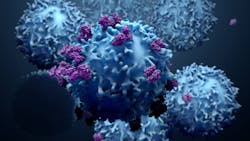A new study led by researchers at The University of Texas MD Anderson Cancer Center, published in Nature Medicine, provides a deeper understanding of the vast diversity of T cell states as well as their relationships and roles within the complex tumor microenvironment, bringing a fresh perspective to understanding immunotherapy efficacy in cancer.
Recent studies have shown that the phenotypic states of T cells, as well as their relative proportions, play a crucial role in determining the effectiveness of immunotherapy and the likelihood of potential adverse effects. This new pan-cancer single-cell T cell atlas integrates 27 single-cell RNA sequencing datasets, including nine unique datasets from MD Anderson, covering 16 cancer types.
One notable discovery from this study is the previously undescribed T cell stress response state, or TSTR. In prior single-cell studies, these T cells often were overlooked or considered to be artifacts related to tissue dissociation. However, with the extensive data available, the researchers were able to identify these cells as a clearly unique group, distinct from other CD4+ or CD8+ T cell subsets, and to validate their existence in situ using multiple spatial profiling methods.
The researchers described a total of 32 T cell states in this study, and further identified seven subpopulations within the CD4+ regulatory subset, five within the CD4+ follicular helper T cell population, and eight states among proliferating T cells.
The team has also developed a tool named TCellMap, which enables researchers to automatically annotate T cells from their datasets by aligning with the high-resolution T cell maps generated by this study.

